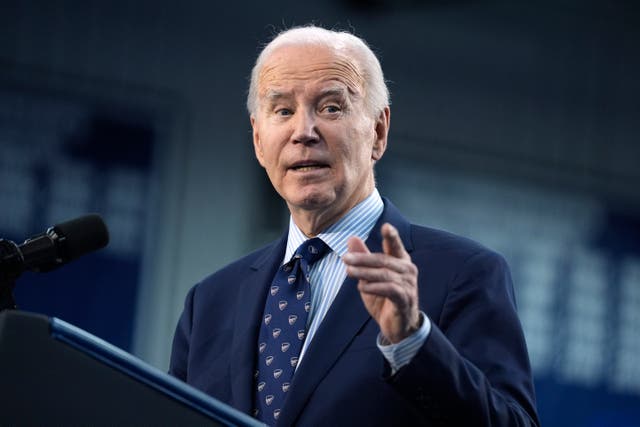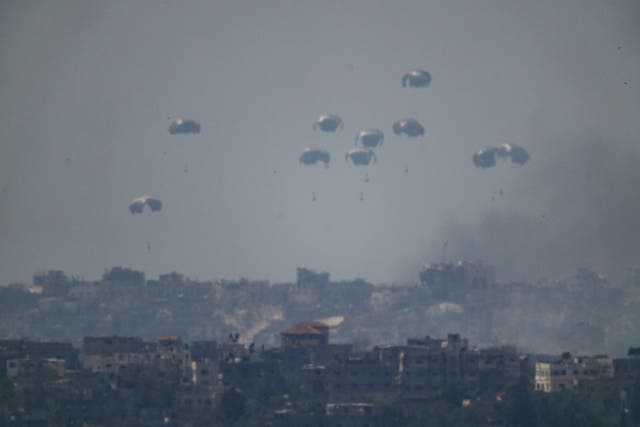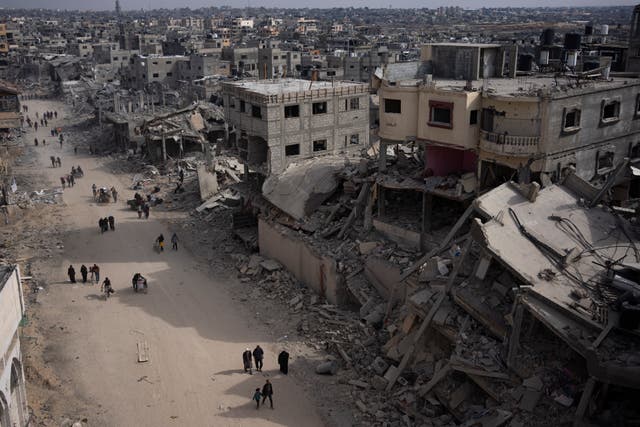US President Joe Biden has called Prime Minister Benjamin Netanyahu’s handling of the war in Gaza a mistake and urged his government to flood Gaza with aid, ramping up pressure on Israel to reach a ceasefire deal and widening a rift between the two staunch allies.
Mr Biden has been an outspoken supporter of Israel’s war against Hamas since the militant group launched a deadly assault on October 7.
But in recent weeks his patience with Mr Netanyahu has appeared to be waning and his administration has taken a more stern line with Israel, rattling the countries’ decades-old alliance and deepening Israel’s international isolation over the war.
Mr Biden’s most recent comments, made in an interview that aired late Tuesday after being recorded last week, highlight the differences between Israel and the US over humanitarian aid to people in Gaza, where a war has led to warnings of imminent famine.

“What he’s doing is a mistake. I don’t agree with his approach,” Mr Biden told Spanish-language broadcaster Univision in an interview conducted on April 3, two days after an Israeli strike on a World Central Kitchen (WCK) convoy, which killed seven aid workers. Israel said the incident was unintentional.
He was responding to being asked if Mr Netanyahu is prioritising his political survival over the national interest.
Mr Biden said Israel should agree to a ceasefire, flood beleaguered Gaza with aid for the next six to eight weeks and allow other countries in the region to help distribute the aid.
“It should be done now,” he said.
Other disagreements have also shaken the relationship in recent weeks of the war, including over Israel’s plans for an offensive in the southernmost Gaza city of Rafah.

Israel says that Rafah is Hamas’s last major stronghold, but more than half of Gaza’s 2.3 million people are currently seeking shelter there.
Hunger in Gaza is overshadowing the Muslim holiday of Eid al-Fitr, a typically joyous festival during which families celebrate the end of the holy month of Ramadan.
Israel halted aid deliveries to Gaza in the early days of the war, but under US pressure has slowly increased trucks allowed to enter the territory.
Still, aid groups have complained that supplies are not reaching desperate people quickly enough, blaming Israeli restrictions, and countries have attempted other ways to deliver them including air drops and by sea.
Israel says its has steadily ramped up aid throughout the war, opening up more entry points for trucks to enter and to reach especially hard-hit areas such as northern Gaza, an early target of Israel’s in the war.
Israel blames aid groups for being too slow to deliver aid once it is inside Gaza. Those groups say logistical issues and the precarious security situation – underscored by the WCK strike – complicate aid deliveries.

Israel and Hamas are currently engaged in talks meant to bring about a ceasefire in exchange for the release of hostages captured by Hamas and others who stormed across the border on October 7. But the sides remain far apart on key issues, including the return of Palestinians to hard-hit northern Gaza.
Mr Netanyahu has vowed to achieve “total victory” in the war, pledging to destroy Hamas’s military and governing capabilities to prevent a repeat of the October 7 attacks and to return the hostages.
But six months into the war, Israel is growing ever more isolated, with even its closest partner increasingly vocal about its discontent in the war’s direction and longtime trading partners such as Turkey taking potentially painful economic steps to express dismay.
Mr Netanyahu is under pressure to decide on a post-war vision for Gaza but critics say he is delaying because he does not want to anger his ultranationalist governing partners, who support resettling the Gaza Strip, which Israel withdrew from in 2005.
Israel launched the war in response to Hamas’s cross-border assault, where militants killed 1,200 people, mostly civilians, and took roughly 250 people hostage, according to Israeli authorities.
More than 33,200 Palestinians have been killed in the relentless fighting, according to Gaza’s Health Ministry which does not differentiate between civilians and combatants in its count but says most of the dead are women and children. Israel says it has killed some 12,000 militants, without providing evidence.
The war has ignited a humanitarian catastrophe. Most of the territory’s population has been displaced and with vast swathes of Gaza’s urban landscape levelled in the fighting, many areas are uninhabitable.




Why are you making commenting on The National only available to subscribers?
We know there are thousands of National readers who want to debate, argue and go back and forth in the comments section of our stories. We’ve got the most informed readers in Scotland, asking each other the big questions about the future of our country.
Unfortunately, though, these important debates are being spoiled by a vocal minority of trolls who aren’t really interested in the issues, try to derail the conversations, register under fake names, and post vile abuse.
So that’s why we’ve decided to make the ability to comment only available to our paying subscribers. That way, all the trolls who post abuse on our website will have to pay if they want to join the debate – and risk a permanent ban from the account that they subscribe with.
The conversation will go back to what it should be about – people who care passionately about the issues, but disagree constructively on what we should do about them. Let’s get that debate started!
Callum Baird, Editor of The National
Comments: Our rules
We want our comments to be a lively and valuable part of our community - a place where readers can debate and engage with the most important local issues. The ability to comment on our stories is a privilege, not a right, however, and that privilege may be withdrawn if it is abused or misused.
Please report any comments that break our rules.
Read the rules hereLast Updated:
Report this comment Cancel